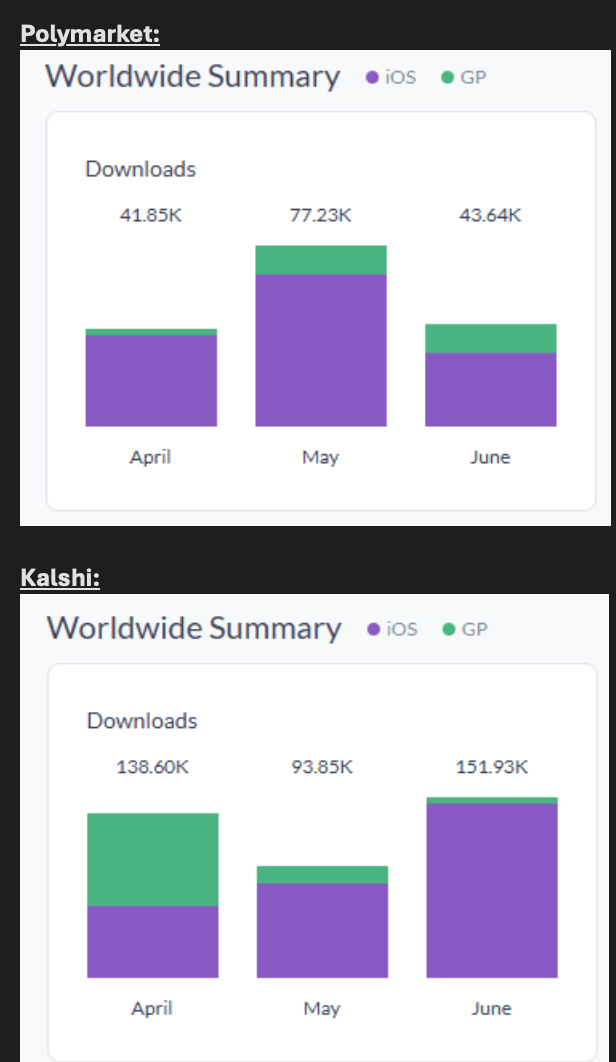One of the biggest stories of the last U.S. presidential election was the uncanny ability of prediction markets Polymarket and Kalshi to forecast the outcome. By early November, the companies had become household names, and soon after venture capitalists invested hundreds of millions of dollars in the hopes that prediction markets would grow into major businesses. But will they? Fortune reviewed download data and other metrics to gauge the popularity of Polymarket and Kalshi, and found a huge drop in activity compared with the high-water mark they achieved on election night last fall.
According to popular analytics site Apptopia, Kalshi saw combined daily downloads from Google and Apple app stores in the U.S. exceed 100,000 last October while that figure was over 50,000 for Polymarket. Since then, download activity has fallen dramatically, as the numbers for June reflect a decline well over 90%:
Apptopia’s figures for daily active users (DAU)—another common metric to assess an app’s popularity—show a similar though less dramatic pattern. On Nov. 6, both apps had their best day ever, in part because of a rush of users coming to collect their post-election winnings, with Kalshi seeing around 400,000 people use its app and Polymarket seeing around 300,000. By mid-June, however, the respective DAU numbers were 27,000 to 32,000 and 5,000 to 10,000.
For context, Apptopia says TikTok’s app gets around 200,000 downloads per day while its daily active user figure is around 69 million. ChatGPT, meanwhile, is still attracting 80,000 to 200,000 downloads a day roughly two years after it launched.
When it comes to the breakdown between different app stores, both Polymarket and Kalshi tilt significantly toward Apple’s App Store. The Apptopia data, which in this case reflects worldwide and not just U.S. downloads, shows a significant shift for both apps in June, likely reflecting that Polymarket’s app was unavailable for a number of days that month:

Apptopia, which has offered app analytics since 2011, does not claim its metrics are precise but rather that they reflect an informed estimate based on its data. In response to a request for comment, a Kalshi spokesperson said Apptopia’s estimate for its user numbers was accurate but that daily downloads in June were closer to 13,000. Polymarket, which is barred from serving U.S. customers (though this could soon change), declined to comment on the data.
On a broader level, the steep decline in download and user activity compared with last October underscores a longtime challenge for prediction market services: how to attract attention—and revenue—outside of the once-every-four-years U.S. presidential election?
While both Kalshi and Polymarket continually offer bets on a wide range of topics—current offerings include everything from future Fed moves to the release of the Epstein files—few of them attract anything close to the interest in presidential election polls. Both sites, though, have seen spikes related to other political contests, including New York’s mayoral primary. Kalshi, meanwhile, has seen its push into sports pay off with a surge in bets for the Super Bowl, and also enjoyed a surge related to the season finale for popular TV show The White Lotus.
Even if Polymarket and Kalshi have yet to hit on a way to attract steady attention from users, they have become a fixture of news coverage, earning them plenty of publicity. Both companies are also in ongoing talks with a range of big companies to provide bespoke data, while Polymarket is exploring the launch of its own cryptocurrency.
As with other new industries, these prediction market services—which also include Robinhood and industry pioneer Predictit—likely require time to figure out an optimal revenue model. And for now, thanks in part to a wave of venture capital money, they appear to have plenty of time to figure it out.













